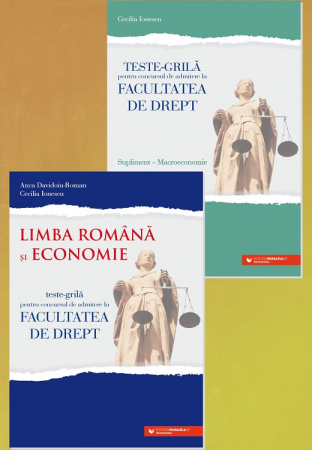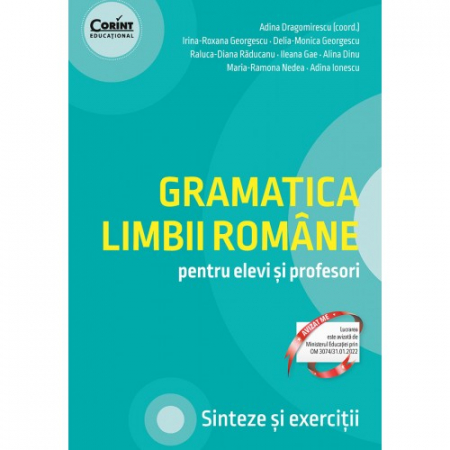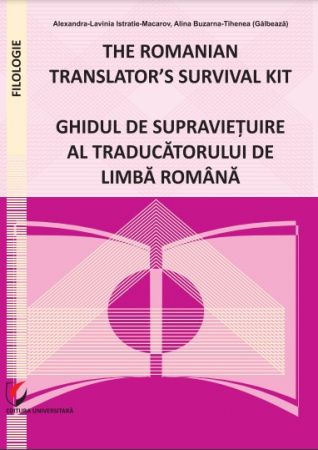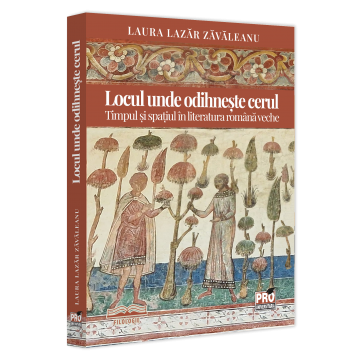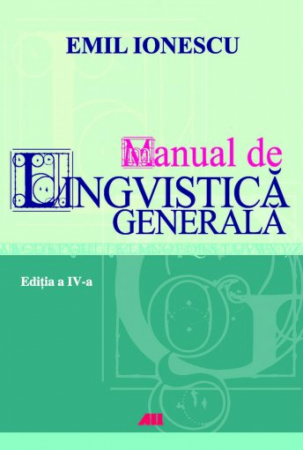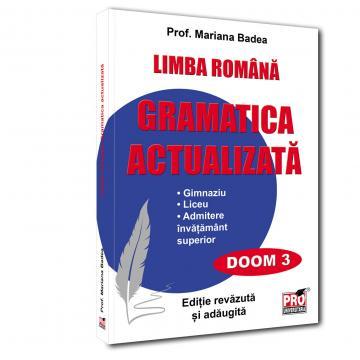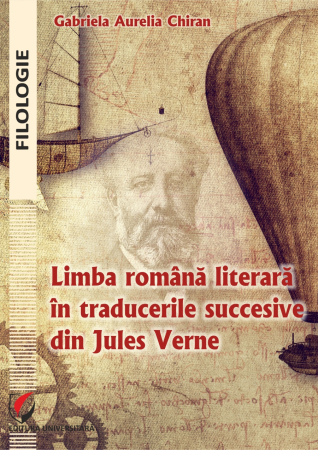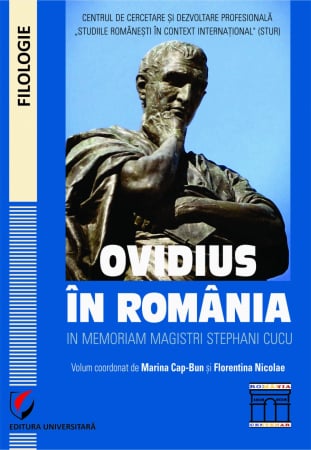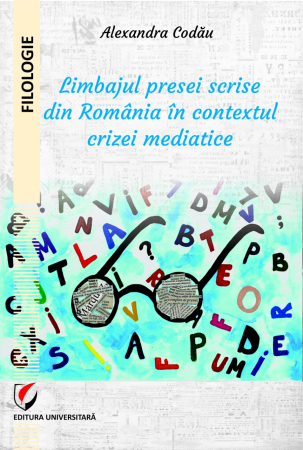Manuscript proposals: [email protected] / 0745 204 115 //// Tracking orders Individuals / Sales: 0745 200 357 / Orders Legal entities: 0721 722 783
Publisher: Editura Universitară
Author: Florentina Nicolae, Marina Cap-Bun
Edition: I
Pages: 394
Publisher year: 2023
ISBN: 978-606-28-1650-6
DOI: https://doi.org/10.5682/9786062816506
Product Code:
9786062816506
Do you need help?
0745 200 357
- Description
- Download (1)
- Authors
- Content
- More details
- Reviews (0)
Romanian language, literature and civilization in the world is the tenth volume edited by STUR, after: Actualitatea lui Caragiale 1912-2012 (2012), Junimea and its impact after 150 years (2013), Literature, theater and film – In honor of playwright Matei Visniec (2015), Eastern European cultures and civilizations. In memoriam Aida Todi (2016), Romanian studies in an inter‑ and transdisciplinary context. In memoriam Marin Mincu (2017), Ovidius in Romania. In memoriam Magistri Stephani Cucu (2018), Romanian Studies in the Centenary Year (2019), 100 years of the Romanian novel (2020), Mihai Eminescu on 170 years since his birth. Reassessments required. In memory of Christina Zarifopol‑Illias (2021).
-
Romanian language, literature and civilization in the world
Download
Coordonatori:
MARINA CAP-BUN
FLORENTINA NICOLAE
MARINA CAP-BUN
FLORENTINA NICOLAE
Introductory details / 7
Literary and cultural studies / 11
Oana Uta‑Barbulescu, Did the extension of the prenominal marking with 'lui / lu' to the feminine Anthroponyms occur in the 16th? / 13
Letitia Guran, The Multiple Homes for Romanian Studies in the United States: Foreign Language Departments or World/Comparative Literature Programs? / 23
Mona Momescu, Leon Feraru – Romanian Studies as Cultural Diplomacy / 37
Elena Ionescu, Notes about the present of music in G. Calinescu / 55
Ioana Vasiloiu, European cultural models / 71
Lacramioara Berechet, The inability to recognize Agnostos Theos and the permanence of evil in history / 79
Luminita Moiseanu (Radu), Shamanism between soteriology and ecstasy in the fantastic prose of Mircea Eliade / 91
Alina Buzatu, "Fictional worlds": metatheoretical coordinates / 99
Corina‑Mihaela Apostoleanu, Contribution of the intellectual elites of interwar Romania in the Dobrogean press / 105
Florentina Nicolae, Cantemirology today. Some considerations / 115
Olga Kaiter, Saxon literary contributions in Romanian literature at the end of the 19th century and in the 20th century / 127
Edith‑Hilde Kaiter, The role of the Saxon elite from Transylvania in Romanian culture / 139
Madalina Stoica, Ionescu vs. Ionesco. From the complexes of a minor literature, to the brilliant "Frenchman" / 149
Alina Anamaria Ganea, Eugen Ionescu between Romania and France / 163
Bianca‑Virginia Ibadula, Romania, identity space between the Europes of obsessions / 171
Mihaela-Ramona Nour (Mandreanu), "The Barber of Seville" and "D'ale carnivalului" / 185
Simona Bitaracu (Micauta), I. L. Caragiale – A novel in Berlin / 205
Alina‑Roxana Cioromelea (Panait), The metamorphoses of cinematographic adaptation. Case study – Liviu Ciulei / 221
Andreea-Catalina Racaru, The modernization process in the Romanian space. The interwar period - the moment of the crystallization of Romania's image in the European cultural context / 235
Ecaterina Alexandru, Ideological control and creative freedom in Romanian literature for children and youth of the communist period / 245
Robert-Andrei Stoica, Mural art as instantiation of the identity of the Dobrogean imaginary / 253
Augustin‑Virgiliu Petcu, Edgar Allan Poe and Mihai Eminescu. Bio-bibliographic guidelines, translations, cultural resources and symbols / 269
Matei Visniec workshop / 295
Marina Cap‑Bun, Shadow of Stalin... in Radauti and Paris / 297
Simona‑Nicoleta Minciu, "A century of fog" - The unrecorded meeting of two titans / 319
Anca David, Windows towards the innocent world / 329
Linguistic research / 339
Cosmin Caprioara, The Romanian language in the attention of foreign linguists from the last century / 341
Mihaela Miron‑Fulea, Numeral / 353
Iuliana Dascalu, Lexico-semantic fields in the vision of Eugen Coseriu / 361
Theodora Flaut, The specialized language in the relationship between the common and the specialized lexicon in physics, astronomy, mathematics and medicine / 375
Data about the authors / 383
Literary and cultural studies / 11
Oana Uta‑Barbulescu, Did the extension of the prenominal marking with 'lui / lu' to the feminine Anthroponyms occur in the 16th? / 13
Letitia Guran, The Multiple Homes for Romanian Studies in the United States: Foreign Language Departments or World/Comparative Literature Programs? / 23
Mona Momescu, Leon Feraru – Romanian Studies as Cultural Diplomacy / 37
Elena Ionescu, Notes about the present of music in G. Calinescu / 55
Ioana Vasiloiu, European cultural models / 71
Lacramioara Berechet, The inability to recognize Agnostos Theos and the permanence of evil in history / 79
Luminita Moiseanu (Radu), Shamanism between soteriology and ecstasy in the fantastic prose of Mircea Eliade / 91
Alina Buzatu, "Fictional worlds": metatheoretical coordinates / 99
Corina‑Mihaela Apostoleanu, Contribution of the intellectual elites of interwar Romania in the Dobrogean press / 105
Florentina Nicolae, Cantemirology today. Some considerations / 115
Olga Kaiter, Saxon literary contributions in Romanian literature at the end of the 19th century and in the 20th century / 127
Edith‑Hilde Kaiter, The role of the Saxon elite from Transylvania in Romanian culture / 139
Madalina Stoica, Ionescu vs. Ionesco. From the complexes of a minor literature, to the brilliant "Frenchman" / 149
Alina Anamaria Ganea, Eugen Ionescu between Romania and France / 163
Bianca‑Virginia Ibadula, Romania, identity space between the Europes of obsessions / 171
Mihaela-Ramona Nour (Mandreanu), "The Barber of Seville" and "D'ale carnivalului" / 185
Simona Bitaracu (Micauta), I. L. Caragiale – A novel in Berlin / 205
Alina‑Roxana Cioromelea (Panait), The metamorphoses of cinematographic adaptation. Case study – Liviu Ciulei / 221
Andreea-Catalina Racaru, The modernization process in the Romanian space. The interwar period - the moment of the crystallization of Romania's image in the European cultural context / 235
Ecaterina Alexandru, Ideological control and creative freedom in Romanian literature for children and youth of the communist period / 245
Robert-Andrei Stoica, Mural art as instantiation of the identity of the Dobrogean imaginary / 253
Augustin‑Virgiliu Petcu, Edgar Allan Poe and Mihai Eminescu. Bio-bibliographic guidelines, translations, cultural resources and symbols / 269
Matei Visniec workshop / 295
Marina Cap‑Bun, Shadow of Stalin... in Radauti and Paris / 297
Simona‑Nicoleta Minciu, "A century of fog" - The unrecorded meeting of two titans / 319
Anca David, Windows towards the innocent world / 329
Linguistic research / 339
Cosmin Caprioara, The Romanian language in the attention of foreign linguists from the last century / 341
Mihaela Miron‑Fulea, Numeral / 353
Iuliana Dascalu, Lexico-semantic fields in the vision of Eugen Coseriu / 361
Theodora Flaut, The specialized language in the relationship between the common and the specialized lexicon in physics, astronomy, mathematics and medicine / 375
Data about the authors / 383
The current volume brings together the works of the international conference Romanian language, literature and civilization in the world, organized by the Professional Research and Development Center "Romanian Studies in International Context", under the auspices of the Ovidius University of Constanta, which took place on October 13-14, 2021, in online format. It is the tenth volume edited by STUR, after: Actualitatea lui Caragiale 1912-2012 (2012), Junimea and its impact after 150 years (2013), Literature, theater and film – In honor of playwright Matei Visniec (2015), Eastern European cultures and civilizations. In memoriam Aida Todi (2016), Romanian studies in an inter‑ and transdisciplinary context. In memoriam Marin Mincu (2017), Ovidius in Romania. In memoriam Magistri Stephani Cucu (2018), Romanian Studies in the Centenary Year (2019), 100 years of the Romanian novel (2020), Mihai Eminescu on 170 years since his birth. Reassessments required. In memory of Christina Zarifopol‑Illias (2021).
Like all the previous volumes, this collection of essays was subjected to a specialized expertise, by scientific referents of the highest academic standards, to whom we thank, once again, for the support given to our project: Prof. univ. Dr. Mircea Martin, University of Bucharest, corresponding member of the Romanian Academy; Univ. Prof. Dr. Lacramioara Petrescu, "Alexandru Ioan Cuza" University from Iasi.
The volume begins with the Literary and Cultural Studies section, in which we give due priority to researches related to the international dimension of Romanian studies, signed by experienced lecturers of these academic programs. Oana Uta‑Barbulescu formulates a question of the history of the language in her study Did the extension of the prenominal marking with 'lui / lu' to the feminine Anthroponyms occur in the 16th Century?. Letitia Guran, lecturer at the University of North Carolina, Chapel Hill, discusses the issue of the status of Romanian studies in American universities, in the work The Multiple Homes for Romanian Studies in the United States: Foreign Language Departments or World/Comparative Literature Programs? Mona Momescu, our colleague with long teaching experience at Columbia University of New York, investigates the cultural-diplomatic dimension of Romanian studies, in her work Leon Feraru - Romanian Studies as Cultural Diplomacy.
Elena Ionescu, from the University of Bucharest, delights us with some inspired Notes about the present of music at G. Calinescu. Ioana Vasiloiu chooses to analyze European cultural models. Lacramioara Berechet investigates The impossibility of recognizing Agnostos Theos and the permanence of evil in history. Alina Buzatu stops at The metatheoretical coordinates of fictional worlds. Corina‑Mihaela Apostoleanu illustrates the Contribution of the intellectual elites of interwar Romania in the Dobrogean press and Florentina Nicolae offers us an exciting update of Cantemirian studies, entitled Cantemirologia today. Some considerations.
The range of intercultural concerns of STUR members is illustrated by the two studies dedicated to Saxon writers from Transylvania signed by Olga Kaiter (Saxon literary contributions in Romanian literature at the end of the 19th century and in the 20th century) and Edith-Hilde Kaiter (The role of the Saxon elite from Transylvania in Romanian culture).
Linguistics research is present in the summary of the volume through the contribution of our colleagues Cosmin Caprioara (Romanian language in the attention of foreign linguists of the last century) and Mihaela Miron-Fulea (Numeralul).
Among the collaborations of STUR member doctoral students who have already defended their theses, we mention Madalina Stoica (Ionescu vs. Ionesco. From the complexes of a minor literature, to the brilliant "Frenchman") and Ecaterina Alexandru, Ideological control and creative freedom in Romanian literature for children and youth of the communist period.
We also mention in the summary of the volume a significant number of doctoral students of the Doctoral School of Humanities at Ovidius University in Constanta, who are in different stages of research: Bianca-Virginia Ibadula (Romania, identity space between the Europes of obsessions), Luminita Moiseanu (Radu ) (Shamanism between soteriology and ecstasy in the fantastic prose of Mircea Eliade), Simona Bitaracu (Micauta) (I. L. Caragiale – A novel in Berlin), Robert-Andrei Stoica (Mural art as instantiation of the identity of the Dobrogean imaginary), Mihaela-Ramona Nou (Mandreanu) ("The Barber of Seville" and "D'ale carnavalului"), Alina Anamaria Ganea (Eugen Ionescu between Romania and France), Alina‑Roxana Cioromelea (Panait) (Metamorphoses of the cinematic adaptation. Case study - Liviu Ciulei), Theodora Flaut (The specialized language in the relationship between the common lexicon and the specialized one in physics, astronomy, mathematics and medicine), Iuliana Dascalu (Lexico-semantic fields in the vision of Eugen Coseriu), Andreea-Catalina Racaru (The modernization process in the Romanian space. The interwar period – the moment of the crystallization of Romania's image in the European cultural context). But the collaboration with STUR and the master's student Augustin‑Virgiliu Petcu, present in the summary with the work of Edgar Allan Poe and Mihai Eminescu, continues. Bio-bibliographic orientations, translations, cultural resources and symbols.
Matei Visniec's workshop, resulting from the research of the working group dedicated to the author, established within STUR in 2014, includes three studies. Two of the contributions, signed by Marina Cap‑Bun and Simona Nicoleta Minciu, are dedicated to the most recent Visniecian novel, A century of fog, signaling the novelty of the narrative formula and the novelist's interest in two diabolical figures who marked the history of the 20th century: Hitler and Stalin. A third study, signed by Anca David, entitled Windows to the innocent world, is dedicated to children's literature, a less addressed compartment of Visnieci's creation.
A series of corrections were suggested by Christian Moraru, professor at the University of North Carolina, Greensboro, USA, to whom the editorial team is deeply grateful.
For the verification of summaries in English, the STUR Center collaborated with Mrs. Allie Rigby, Fulbright lecturer affiliated with the Ovidius University of Constanta, to whom the editorial team warmly thanks.
As always, we hope that this tome will be a useful source of information, both for students, masters and doctoral students, as well as for the general public, already familiar with the study volumes of the STUR center.
The editors
Like all the previous volumes, this collection of essays was subjected to a specialized expertise, by scientific referents of the highest academic standards, to whom we thank, once again, for the support given to our project: Prof. univ. Dr. Mircea Martin, University of Bucharest, corresponding member of the Romanian Academy; Univ. Prof. Dr. Lacramioara Petrescu, "Alexandru Ioan Cuza" University from Iasi.
The volume begins with the Literary and Cultural Studies section, in which we give due priority to researches related to the international dimension of Romanian studies, signed by experienced lecturers of these academic programs. Oana Uta‑Barbulescu formulates a question of the history of the language in her study Did the extension of the prenominal marking with 'lui / lu' to the feminine Anthroponyms occur in the 16th Century?. Letitia Guran, lecturer at the University of North Carolina, Chapel Hill, discusses the issue of the status of Romanian studies in American universities, in the work The Multiple Homes for Romanian Studies in the United States: Foreign Language Departments or World/Comparative Literature Programs? Mona Momescu, our colleague with long teaching experience at Columbia University of New York, investigates the cultural-diplomatic dimension of Romanian studies, in her work Leon Feraru - Romanian Studies as Cultural Diplomacy.
Elena Ionescu, from the University of Bucharest, delights us with some inspired Notes about the present of music at G. Calinescu. Ioana Vasiloiu chooses to analyze European cultural models. Lacramioara Berechet investigates The impossibility of recognizing Agnostos Theos and the permanence of evil in history. Alina Buzatu stops at The metatheoretical coordinates of fictional worlds. Corina‑Mihaela Apostoleanu illustrates the Contribution of the intellectual elites of interwar Romania in the Dobrogean press and Florentina Nicolae offers us an exciting update of Cantemirian studies, entitled Cantemirologia today. Some considerations.
The range of intercultural concerns of STUR members is illustrated by the two studies dedicated to Saxon writers from Transylvania signed by Olga Kaiter (Saxon literary contributions in Romanian literature at the end of the 19th century and in the 20th century) and Edith-Hilde Kaiter (The role of the Saxon elite from Transylvania in Romanian culture).
Linguistics research is present in the summary of the volume through the contribution of our colleagues Cosmin Caprioara (Romanian language in the attention of foreign linguists of the last century) and Mihaela Miron-Fulea (Numeralul).
Among the collaborations of STUR member doctoral students who have already defended their theses, we mention Madalina Stoica (Ionescu vs. Ionesco. From the complexes of a minor literature, to the brilliant "Frenchman") and Ecaterina Alexandru, Ideological control and creative freedom in Romanian literature for children and youth of the communist period.
We also mention in the summary of the volume a significant number of doctoral students of the Doctoral School of Humanities at Ovidius University in Constanta, who are in different stages of research: Bianca-Virginia Ibadula (Romania, identity space between the Europes of obsessions), Luminita Moiseanu (Radu ) (Shamanism between soteriology and ecstasy in the fantastic prose of Mircea Eliade), Simona Bitaracu (Micauta) (I. L. Caragiale – A novel in Berlin), Robert-Andrei Stoica (Mural art as instantiation of the identity of the Dobrogean imaginary), Mihaela-Ramona Nou (Mandreanu) ("The Barber of Seville" and "D'ale carnavalului"), Alina Anamaria Ganea (Eugen Ionescu between Romania and France), Alina‑Roxana Cioromelea (Panait) (Metamorphoses of the cinematic adaptation. Case study - Liviu Ciulei), Theodora Flaut (The specialized language in the relationship between the common lexicon and the specialized one in physics, astronomy, mathematics and medicine), Iuliana Dascalu (Lexico-semantic fields in the vision of Eugen Coseriu), Andreea-Catalina Racaru (The modernization process in the Romanian space. The interwar period – the moment of the crystallization of Romania's image in the European cultural context). But the collaboration with STUR and the master's student Augustin‑Virgiliu Petcu, present in the summary with the work of Edgar Allan Poe and Mihai Eminescu, continues. Bio-bibliographic orientations, translations, cultural resources and symbols.
Matei Visniec's workshop, resulting from the research of the working group dedicated to the author, established within STUR in 2014, includes three studies. Two of the contributions, signed by Marina Cap‑Bun and Simona Nicoleta Minciu, are dedicated to the most recent Visniecian novel, A century of fog, signaling the novelty of the narrative formula and the novelist's interest in two diabolical figures who marked the history of the 20th century: Hitler and Stalin. A third study, signed by Anca David, entitled Windows to the innocent world, is dedicated to children's literature, a less addressed compartment of Visnieci's creation.
A series of corrections were suggested by Christian Moraru, professor at the University of North Carolina, Greensboro, USA, to whom the editorial team is deeply grateful.
For the verification of summaries in English, the STUR Center collaborated with Mrs. Allie Rigby, Fulbright lecturer affiliated with the Ovidius University of Constanta, to whom the editorial team warmly thanks.
As always, we hope that this tome will be a useful source of information, both for students, masters and doctoral students, as well as for the general public, already familiar with the study volumes of the STUR center.
The editors
If you want to express your opinion about this product you can add a review.
write a review

6359.png)
![Romanian language, literature and civilization in the world - Marina Cap-Bun, Florentina Nicolae [1] Romanian language, literature and civilization in the world - Marina Cap-Bun, Florentina Nicolae [1]](https://gomagcdn.ro/domains/editurauniversitara.ro/files/product/large/limba-literatura-si-civilizatia-romana-in-lume-254240.jpg)
